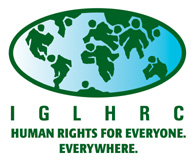On July 19, 2010, the full United Nations Economic and Social Council (ECOSOC) voted in favor of a US-led resolution to grant the International Gay and Lesbian Human Rights Commission (IGLHRC) consultative status. IGLHRC is only the tenth organization working primarily for lesbian, gay, bisexual, and transgender (LGBT) human rights to gain such status at the United Nations.

"Today's decision is an affirmation that the voices of lesbian, gay, bisexual, and transgender people have a place at the United Nations as part of a vital civil society community," said Cary Alan Johnson, IGLHRC Executive Director. "The clear message here is that these voices should not be silenced and that human rights cannot be denied on the basis of sexual orientation or gender identity."
The resolution passed with 23 in favor, 13 against, 13 abstentions and 5 absences.
This victory is particularly significant, coming as it does after a prolonged 3-year application process in the sub-committee that makes initial recommendations on status. Despite full compliance with all procedures IGLHRC faced deferrals, homophobic questioning, and procedural roadblocks in the ECOSOC NGO Committee.
Today's decision overturned a "no-action" vote in the NGO-committee that threatened to establish a dangerous precedent and the possibility of organizations deemed controversial being continuously denied the opportunity to have their application put to a vote even after undergoing the required review.
The vote also signals a recognition of the important role of a diverse and active civil society at the UN. In support of progress on IGLHRC's application, a group of over 200 NGOs from 59 countries endorsed a letter to all UN Member States, demanding fair and non-discriminatory treatment and supporting IGLHRC's goal of amplifying LGBT voices in the international arena.
"As human rights defenders and LGBT people living in countries where homophobic discrimination is a daily reality, we celebrate the accreditation of IGLHRC at the UN," said Frank Mugisha, Chairperson of Sexual Minorities Uganda (SMUG), one of 13 NGOs from Uganda to publicly call for IGLHRC to be accredited. "IGLHRC's access to the UN means that we too will have greater access to international human-rights mechanisms that can prove invaluable to LGBT people's lives."
The government of the United States stood strongly behind IGLHRC's application, calling for a vote in both the NGO Committee and ECOSOC. Ambassador Susan Rice, US Permanent Representative to the United Nations, publicly supported IGLHRC's application. Additionally, 14 members of the US House of Representatives and 4 Senators sent letters of support for IGLHRC's application to all UN Member States. Among them were Senator John Kerry, Chair of the Senate Committee on Foreign Relations, and Congressman Howard Berman, Chair of the House Committee on Foreign Affairs.
The victory continues the upward trajectory for LGBT rights at the UN. It allows IGLHRC to participate in a more formal way through attending meetings, submitting statements and collaborating with the UN and governments in the international human-rights arena.
"We celebrate this decision," stated Toni Reis, president of the Brazilian LGBT group, Associação Brasileira de Lésbicas, Gays, Bissexuais, Travestis e Transexuais (ABGLT) - that in 2009 was the last LGBT organization to receive status. "It is crucial that LGBT NGOs have the opportunity to participate in the UN human rights debate - though in future, organizations should receive full and fair reviews before the NGO Committee itself."
Despite the limited opportunities offered to non-accredited NGOs, IGLHRC has a long history of advocating at the UN for the rights of all people, regardless of sexual orientation and gender identity. The organization advocated for sexual rights to be included in the official discussions at the 1995 UN Fourth World Conference on Women in Beijing; spoke at the first UN General Assembly meeting on HIV and AIDS in 2001; and in recent years has been part of a collaboration between NGOs and supportive States that resulted in the groundbreaking 2008 UNGA Declaration on Sexual Orientation and Gender Identity, signed by 67 UN Member States.
The votes on this resolution granting IGLHRC special consultative status were as follows:
Vote For - 23
Argentina, Australia, Belgium, Brazil, Canada, Chile, Estonia, Finland, France, Germany, Guatemala, Italy, Japan, Liechtenstein, Malta, Norway, Peru, Poland, Rep. of Korea, Slovenia, United Kingdom, United States, Uruguay
Votes Against - 13
Bangladesh, China, Comoros, Egypt, Malaysia, Morocco, Namibia, Niger, Pakistan, Russian Fed., Saudi Arabia, Venezuela, Zambia,
Abstaining - 13
Bahamas, Cote D'Ivoire, Ghana, India, Mauritius, Mongolia, Mozambique, Philippines, Rep. of Moldova, Rwanda, Saint Kitts & Nevis, Turkey, Ukraine
Absent - 5
Cameroon, Congo, Guinea-Bissau, Iraq, Saint Lucia
